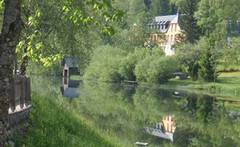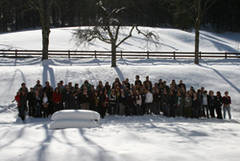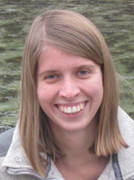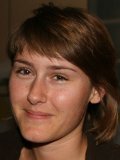Reduction of indigenous Arctic Charr populations in Lake Lunz - Research funded by the provincial government of Lower Austria allows the team of Dr. Martin Kainz to investigate effects of introduced pike on the food web structure of Lake Lunz.
Iris Baart defended successfully her PhD thesis with the title „Historical and potential development of macrophytes in the Lobau due to hydrological and morphological conditions” at the University of Natural Resources and Life Sciences, Vienna on March 15th. Major parts of her PhD thesis have been published in 2 articles (Baart et al. 2010 and Baart et al. 2012).
The 3rd international meeting "Fresh Blood for Freshwater 2013" took place at the WasserCluster Lunz from 27th February to 1st March. More than 95 young limnologists from 11 European countries attended the conference to share ideas, establish contacts, and present ongoing or finalized research. Key-lectures informed about perspectives in fundamental and applied limnology and European research programs and funding possibilities. In addition, workshops were offered which encompassed public outreach activities, life balance with a work in science, successful proposal writing, and modern data presentation and illustration. The meeting was organized by WasserCluster Lunz and SIL Austria.
LIMNOTIP – Can climate change cause lakes to tip? Together with researchers from Sweden, Norway, and Germany, the research group of Martin Kainz at WasserCluster Lunz examines how changes of temperature and organic matter input to lakes affect biodiversity and biochemical composition of the planktonic lake food webs.
Iris Schönbrunner was awarded the “Wissenschaftlicher Förderpreis 2012 der Umweltschutzabteilung der Stadt Wien“ for her diploma thesis conducted at the WasserCluster Lunz. In her thesis she investigated the phosphorus-release behaviour of sediments of isolated water bodies in the floodplain Lower Lobau with respect to different cycles of drying and re-wetting simulated in a laboratory experiment.
http://www.wien.gv.at/rk/msg/2012/11/28005.html
http://www.sciencedirect.com/science/article/pii/S0048969712008406
The 44th annual meeting of the working group of hydrology, organized by Mr. Peter Chifflard, was held on November 2012, 15-17, at the WasserCluster in Lunz am See. More than 40 participants of Germany, Austria, India, China and Peru attended the conference and presented a lot of very interesting lectures and posters which show a broad variety of water related scientific fields of work. Finally heartily and warmly thanks will be given to the Gouvernement of Lower Austria, municipality Lunz am See, Autohaus Lunz, Raiffeisenbank Region Eisenwurzen, Fachgemeinschaft Hydrologische Wissenschaften, WasserCluster Lunz and Unimarkt Lunz for the financial support. (klick on photo to enlarge)
I am originally from the country music capital of the world, Nashville, Tennessee, USA. I completed my BSc in biology at Middle Tennessee State University, and moved north to complete my MSc and PhD at the Great Lakes Institute for Environmental Research in Windsor, Ontario, Canada. I am interested in how aquatic animals cope with temperature-driven variability in food quantity and quality. Most of my research to date has focused on Arctic marine food webs and on the ecology of Greenland sharks, which are the only shark to inhabit ice-covered North Atlantic seas. I am excited to be working at WasserCluster, and to begin exploring how temperature affects freshwater animals living in Lake Lunz!
Bernadette Teufl successfully defended her MSc-thesis " Effects of bank and channel morphology on the sediment quality of agricultural first-order streams".
We congratulate Bernadette and wish the best for her future time.










